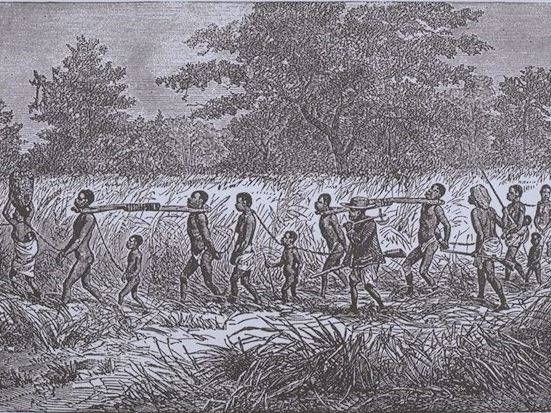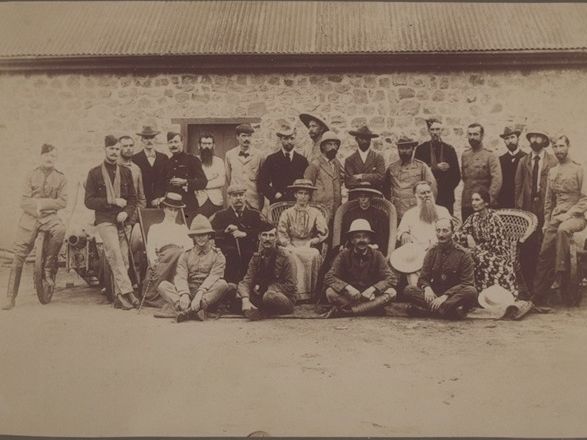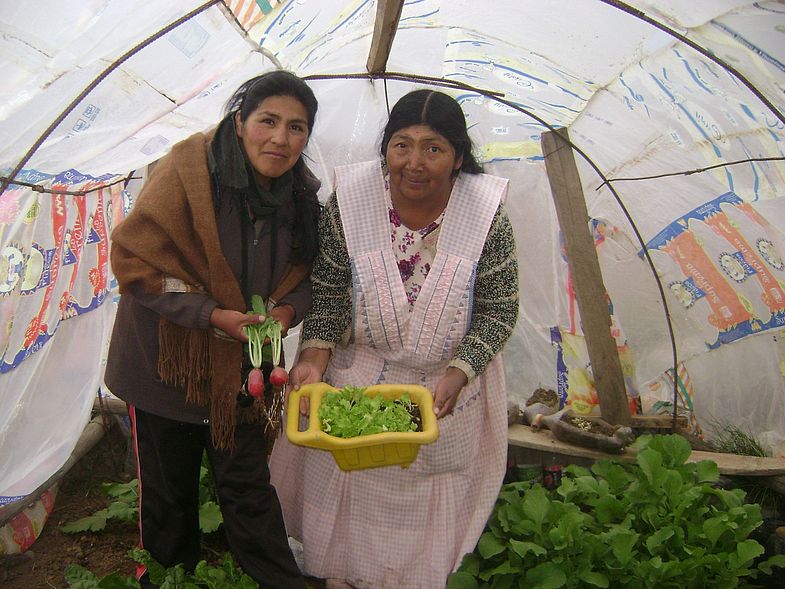What role did Christian missionary societies play in the context of slavery and colonialism? Are there historical points of contact with racism and discrimination? Mission 21 brings the multi-layered history of mission, colonialism and slavery into focus in order to sharpen the focus for the current social debate on racism and discrimination. The transparent and scientific reappraisal of mission history is an important concern of Mission 21, and we support the critical examination of our history or the history of the Basel Mission. We hope that we can make a constructive contribution to important socio-political debates.
Colonial Looting of Cultural Artefacts: Restitution? Reparation? (Recording of the webinar from June 12, 2024)
Ritual objects, cultural artefacts, plants and animals from all over the world looted during the colonial era are stored in European museums - including in Switzerland. The Basel Mission also collected religious, ethnographic and natural objects for research and exhibition purposes in its working areas in Africa and Asia. Should non-European cultural artefacts remain in Western museums today? What does an appropriate restitution practice look like? Cultural anthropologist Isabella Bozsa researched the ways in which the Basel Mission brought objects to Basel and how missionary collecting was entangled with colonial and scientific networks. With cultural scholar Kokou Azamede from the University of Togo in Lomé, we will discuss questions of restitution and the challenges of dealing appropriately with non-European cultural artefacts in Western museums.
Between racism and respect: What do colonialism and mission have to do with racism? (Recording of the webinar from March 20, 2024)
How did missionaries engage with foreign cultures and people in the 19th century? The portrayals of non-European societies in historical missionary publications provide illuminating answers to this question. German scholar Tevodai Mambai examined German-language travel and missionary reports about mountain dwellers in northern Cameroon and north-eastern Nigeria. And Marilyn Umurungi, art and cultural practitioner, analyzes how such descriptions of that time still shape our view of Black people today. In our webinar series, we bring the two researchers into conversation.
Anti-slavery movement, colonial state and Christian mission (Recording webinar from November 22, 2023)
Although the leadership of the Basel Mission strongly opposed slavery, missionaries in African countries sometimes had a different attitude. What role did Christian missions play in the international anti-slavery movement? Did their attitudes conflict with colonial authorities? And how did indigenous anti-slavery activists in Ghana position themselves on the abolition of slavery by the British colonial administration?
With Dr. Michael Odijie, University College London
Voices from the Archives: Indian Bible Women in Colonial Times (recorded webinar October 18, 2023).
A new look at the testimonies of indigenous "Bible women" (catechists) in India as key players in the Basel mission at the end of the 19th century. How did they manage to walk the tightrope between indigenous and European ideals of femininity? How did they move between the hierarchic caste system and Christian lifestyles? What kind of emancipation was possible in India at the time of the British Empire?
Childhood Between Cultures: Missionary Children in the Colonial Era (recorded webinar June 15, 2023).
How did Indian children experience the strict discipline in the boarding schools of the Basel Mission in southern India? How did children from mission families cope with the forced separation from their parents? These questions are explored by two historians from Basel and Delhi. They report on childhood and childhood in the environment of the Basel Mission in the 19th century, in different cultural contexts.
Swiss Colonial Trade and the Basel Mission Trading Company (Recording Webinar May 4, 2023).

What role did the Basel Mission Trading Company, founded in 1859, play in international commodity trade? This question was explored in the current Mission 21 webinar. Historian Dr. Lea Haller took a deep dive into the 18th and 19th centuries, explained the prerequisites for the success of the trading houses, why the Basel Mission with its trading company was a special case in Swiss colonial trade, and what role Switzerland plays in commodity trading today.
Mission and Colonial Violence in the First World War
Chinese historian Iris Leung Chui-wa will give a talk on the Basel Mission’s work in China. The Basel Mission sent their first missionaries to Hong Kong in 1847, five years after its establishment as a British colony. During the First World War, the Basel Mission faced considerable difficulties when it was officially classified as the British Empire’s enemy and expelled from Hong Kong. Its missionaries were interned and its assets were seized by the authorities. Iris Leung Chui-wa will explain the reasons for the colonial government’s aggressive policy and demonstrate how the Basel Mission’s absence from Hong Kong contributed to speeding up the independence of its Chinese churches.
Black Voices from the Archives
The voices of Black people - and Black women in particular - are still not adequately represented in mission history. Historian and former archivist of the Basel Mission, Dr. Paul Jenkins, takes a look at some of the testimonies of Black women and men from the Gold Coast (Ghana), including the first Ghanaian ordained as a pastor by the Basel Mission, Theophil Opoku (1842-1913): Opoku's reports to the Basel Mission House shed unusual light on the reception of his message by the native communities among whom he ministered, as well as on his relations with the British colonial power.
Mission: Religious Imperialism and/or Cultural Imperialism?
Was the spread of the Gospel by the missions in the 19th century an act of cultural arrogance? The German historian Dr. Karolin Wetjen and the Indian historian Dr. Mukesh Kumar presented their research on the Leipzig and Basel missions and looked at the historical interconnections of colonialism, religion, culture and claims to dominance. To what extent was the contact of missionaries with the native population an encounter of equals, and to what extent was it determined by a (supposed) cultural divide? It became apparent that the relationship between mission and colonialism was complex: Karolin Wetjen concluded that "civilizing mission and proselytizing mission" could not be separated from each other. Their relationship had been renegotiated again and again. Mukesh Kumar noted that the work of the Basel missionaries in South India in the 19th century was also shaped by religious and cultural intentions. Conversion to Christianity was only possible in connection with a "laborious" and abstinent life according to the missionaries' guidelines. The missionaries acted as convinced representatives of a Western European-influenced Protestant religion and culture, which they regarded as superior.
Mission and slavery

The role of Christian mission societies in the context of slavery is ambivalent. The leadership of the Basel Mission was strictly against slavery in its mission areas in Africa. Certain missionaries on the ground, however, adhered to the guidelines from Basel only after long discussions.
Closer examination reveals that slavery manifested itself differently in different cultural and historical contexts. The transatlantic slave trade is not synonymous with (indigenous) slavery on the African Gold Coast in the 19th century.
What can we learn from a differentiated view of the historical interconnections and conflicts of missionary societies with colonialism and slavery for our contemporary approach to racism and discrimination?
Watch the entire webinar on the topic
Mission and colonialism

In the 19th and early 20th centuries, the Basel Mission was mainly active in countries colonized by European states, like many other missionary societies. The colonial powers created the conditions for the missions to expand their activities, they provided protection for the missionaries and created an infrastructure by developing roads or railroads. These interconnections and dependencies were not free of disputes. Missionary societies opposed each other when they saw their tasks and interests threatened. In the case of the Basel Mission in Cameroon and the American Board of Commissioners for Foreign Missions in Liberia in the 19th century, both sided with the native populations against the colonial administrations when they became convinced that the people were being oppressed by the colonial governments. At the same time, they wanted to ensure the success of the missionary work through their resistance, i.e. to continue to have access to the native population and to be able to open up further mission areas.
Watch the entire webinar on the topic
Next webinars
Next webinars in our series on the intertwined history of mission and colonialism
What does the food crisis have to do with (neo)colonial food systems?

Today, 735 million people suffer from chronic hunger - mainly women and children in rural areas. At the same time, over 900 million tons of food are thrown away every year - a quarter of which would be enough to feed the hungry. What developments have led to the global food crisis? How can food sovereignty be strengthened through biodiverse, sustainable, local agriculture? In this webinar, we want to find answers and provide suggestions for action.
Event reports
Sorry, we couldn't find any posts. Please try a different search.



